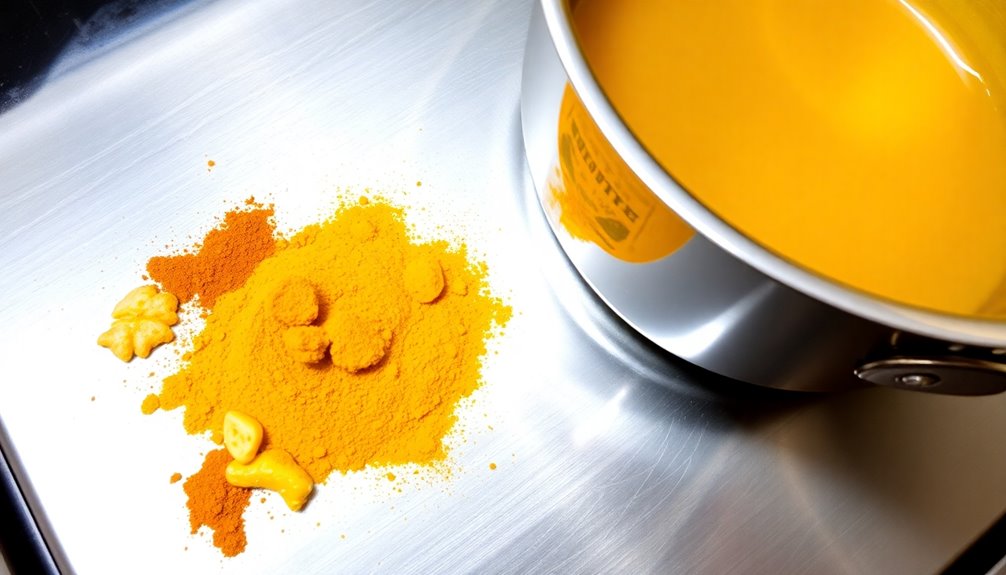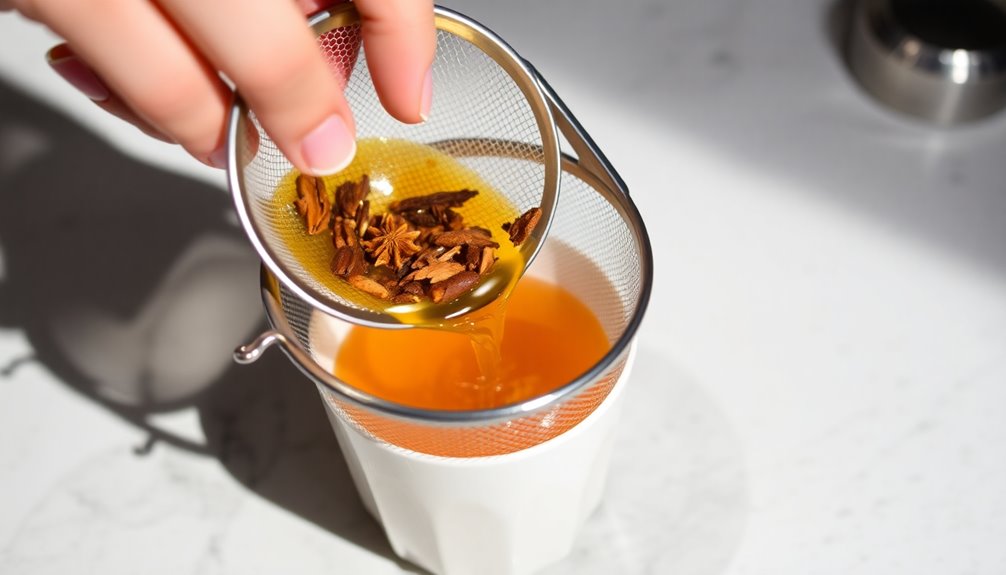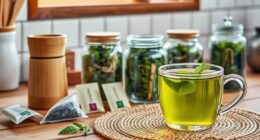Whip up this delightful turmeric, ginger, cinnamon, and black pepper tea to harness the incredible health benefits of these ancient spices. First, bring water, turmeric, ginger, and cinnamon to a boil, then simmer for 10-15 minutes. Strain the tea and stir in honey and lemon juice. Top it off with a pinch of black pepper to enhance the absorption of turmeric's key compound, curcumin. Sip this warming elixir hot or over ice – it's perfect any time you need a soothing and restorative boost. Keep reading to discover the fascinating history and even more ways to enjoy this powerhouse tea.
History

Though turmeric, ginger, cinnamon, and black pepper have been used for centuries in various traditional medicinal practices, their combination in a tea has ancient roots.
Turmeric, known for its anti-inflammatory and healing properties, has been part of Ayurvedic medicine in India for over 4,000 years.
Ginger, utilized in ancient China for digestive issues and nausea relief, shares a long history with these spices.
Cinnamon, valued since ancient times, even appeared in Egyptian texts dating back to 2,000 BCE.
Black pepper, once a highly sought-after trade good in ancient Rome, also contributes its unique medicinal benefits to this remarkable blend of flavors and wellness.
Recipe

Turmeric, ginger, and cinnamon are a powerhouse combination, offering a range of health benefits. This tea not only soothes the senses with its warm, aromatic blend, but also provides a boost of antioxidants and anti-inflammatory properties.
The addition of black pepper enhances the absorption of curcumin, the active compound in turmeric, making this tea a truly wellness-promoting elixir. Sipping on this comforting brew is a delightful way to start the day or unwind in the evening. Adaptogenic herbs can also support energy levels, making this tea a perfect complement to your wellness routine.
Its versatility allows you to enjoy it hot or iced, making it a refreshing option for any season.
Ingredients:
- 2 cups water
- 1/2 teaspoon ground turmeric
- 1/2 teaspoon chopped fresh ginger
- 1/2 teaspoon ground cinnamon
- 1 tablespoon honey
- Juice of 1/2 lemon
- Pinch of black pepper
Instructions:
Combine the water, turmeric, ginger, and cinnamon in a saucepan. Bring the mixture to a boil, then reduce heat and let it simmer for 10-15 minutes, allowing the flavors and nutrients to infuse the water.
Strain the tea into a cup to remove any solid pieces. Stir in the honey and lemon juice, and finish with a pinch of black pepper.
For optimal absorption of curcumin from the turmeric, it's important to include the black pepper. This simple addition can significantly boost the bioavailability of this powerful compound.
Enjoy your turmeric ginger cinnamon black pepper tea warm or over ice, depending on your preference and the season.
Cooking Steps

Start by combining the water, turmeric, ginger, and cinnamon in a saucepan.
Let the mixture simmer for 10-15 minutes, allowing the spices to infuse the water.
Finally, strain the tea through a fine-mesh sieve before pouring it into cups and serving it hot.
Step 1. Combine All Ingredients in a Saucepan

Begin by bringing 2 cups of water to a boil in a saucepan.
Once it's bubbling away, stir in ½ teaspoon each of turmeric powder, chopped fresh ginger, and ground cinnamon.
This ginger turmeric tea will simmer for 10-15 minutes, allowing the flavors to infuse the water.
Strain the tea into a cup, removing any solid bits.
For an extra health boost, stir in 1 tablespoon of honey.
Finish with a squeeze of fresh lemon and a sprinkle of black pepper and ginger.
Enjoy this fragrant, soothing tea and savor its many health benefits.
Step 2. Simmer Ingredients for 10-15 Minutes

After bringing the water to a boil, you'll want to stir in the turmeric, ginger, and cinnamon.
This turmeric tea recipe calls for simmering the ingredients for 10-15 minutes to fully extract their flavors and health benefits.
The ground cinnamon will infuse the tea with its warm, earthy notes, while the ginger adds a refreshing zing.
Pepper helps enhance the absorption of turmeric's anti-inflammatory properties.
Remember to stir the mixture occasionally to ensure the spices are well combined and infusing properly.
This simmering step is crucial for creating a flavorful, aromatic turmeric tea.
Step 3. Strain the Tea Through a Fine-Mesh Sieve

To strain the turmeric ginger cinnamon black pepper tea, you'll want to use a fine-mesh sieve to effectively separate the liquid from the solid ingredients after simmering.
Be sure to place the sieve over a bowl or cup to catch all the brewed tea while preventing any sediment from passing through.
Slowly pour the tea through the sieve, allowing the liquid to flow easily without splashing.
If desired, you can line the fine-mesh sieve with cheesecloth for an even clearer tea, capturing any fine particles that might escape.
Finally, you can discard the solid remnants or repurpose the leftover ginger and turmeric in other recipes.
Step 4. Pour the Strained Tea Into Cups

Next, pour the strained tea into individual cups. Be careful to leave behind any solid pieces of ginger and spices.
For a clearer tea, use a fine mesh strainer to reduce sediment and enhance the drinking experience. Consider pouring the vibrant golden tea into clear glass cups for an aesthetically pleasing presentation.
After pouring, you can add sweeteners like honey or maple syrup to taste. Serve the tea warm to maximize its health benefits, or pour it over ice for a refreshing iced version, especially during warmer months. For a creamier option, you can also add a splash of milk or a dairy-free alternative like almond or oat milk. This will give your tea a velvety texture and turn it into a refreshing iced latte. You can even top it off with a sprinkle of cinnamon or a dollop of whipped cream for an extra indulgent treat.
The choice is yours – enjoy your homemade turmeric ginger cinnamon black pepper tea!
Step 5. Serve Hot and Enjoy

Once you've strained the aromatic tea, pour it into your favorite mug or cup.
Serve this immune-boosting, anti-inflammatory, and antioxidant-rich beverage hot to maximize its soothing effects.
Sweeten it to taste by adding a drizzle of honey or maple syrup, which will preserve the natural properties of the sweeteners.
For a refreshing twist, consider squeezing in a few drops of lemon juice, which enhances the flavor and provides a boost of vitamin C.
Sip and enjoy this comforting tea immediately, as it's best savored warm.
If you have any leftovers, simply reheat the tea gently on the stove or in the microwave, avoiding boiling to maintain the integrity of the ingredients. Additionally, incorporating curcumin's anti-inflammatory properties into your daily routine can further support overall health.
Final Thoughts

Although turmeric ginger cinnamon black pepper tea is a remarkably versatile and beneficial beverage, it's crucial to remember that it shouldn't replace your daily water intake for proper hydration.
The recipe makes a concentrated infusion, so feel free to add the honey and ground pepper to taste. This way, you can personalize the flavor to your liking and still enjoy the daily values of antioxidants and anti-inflammatory compounds.
Whether you prefer it hot or iced, this tea can be a delightful addition to your wellness routine, providing a soothing experience and potential health benefits with each sip. Additionally, incorporating anti-inflammatory properties into your diet may further enhance your skin's vitality and overall health.
Frequently Asked Questions
What Is Turmeric, Ginger, Cinnamon, and Black Pepper Good For?
Turmeric, ginger, cinnamon, and black pepper are fantastic spices that can do wonders for your health!
Turmeric's curcumin is an amazing anti-inflammatory, while ginger helps with digestion and nausea.
Cinnamon is packed with antioxidants and can support heart health and blood sugar levels.
And black pepper? It boosts the absorption of turmeric's curcumin, making it even more powerful.
Together, these spices create a real powerhouse for your body and mind.
Does Drinking Turmeric, Ginger, and Cinnamon Help You Lose Weight?
Yes, drinking turmeric, ginger, and cinnamon can help you lose weight!
These spices boost your metabolism, curb hunger, and regulate blood sugar – all of which support healthy weight management.
The combination of these ingredients not only aids digestion but also reduces inflammation, which is often linked to weight gain.
How Much Turmeric, Cinnamon, and Ginger Do You Put in Your Coffee?
When adding spices to your coffee, start with around 1/4 to 1/2 teaspoon of ground turmeric for a warm, anti-inflammatory boost.
Try 1/4 teaspoon of cinnamon to help regulate blood sugar and create a rich flavor.
For a spicy kick and digestive support, use about 1/2 teaspoon of fresh grated ginger or 1/4 teaspoon of ground ginger.
Finish with a pinch, about 1/8 teaspoon, of black pepper to enhance the absorption of turmeric's benefits.
Adjust the amounts to suit your personal taste preferences.
What Are the Side Effects of Turmeric, Ginger, Cinnamon, Black Pepper Tea?
While spices like turmeric, ginger, cinnamon, and black pepper can offer health benefits, consuming them in excess may cause side effects.
Turmeric and ginger can upset your stomach, while cinnamon and black pepper may irritate your digestive system.
It's best to stick to the recommended daily amounts and check with your doctor if you have any medical conditions or take certain medications, as these spices can potentially interact.
Moderation is key to enjoying the flavors without experiencing unwanted side effects.
Conclusion
This warming tea is a delightful way to add some spice to your day. The mix of turmeric, ginger, cinnamon, and black pepper creates a flavorful and soothing brew. With just a few simple steps, you can easily make this comforting drink at home. Why not give it a try? You might just find a new favorite way to relax and unwind.










